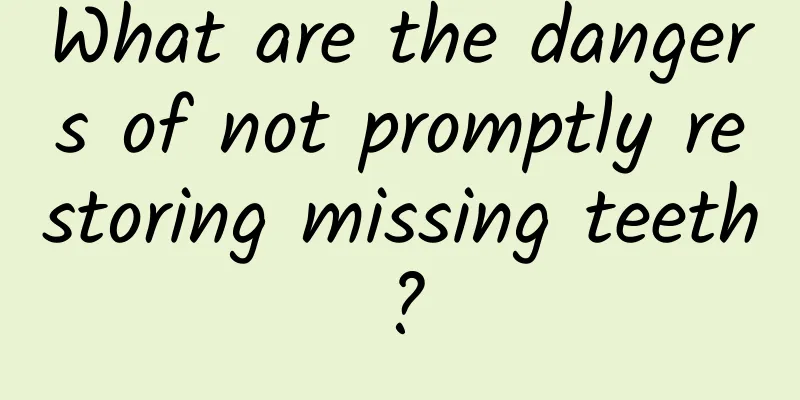What are the dangers of not promptly restoring missing teeth?

|
Many people think that missing teeth are not a big deal, but they don’t know that missing teeth may not affect their lives in the short term, but long-term missing teeth can cause harm to their oral and physical health. 01 Affects facial beauty The impact of missing teeth on aesthetics is the most obvious. It will cause the patient's lips to sink, which has a great impact on the overall appearance of the person and will give people a feeling of oldness. 02 Affects pronunciation Missing teeth, especially front teeth, can cause unclear pronunciation, commonly known as "talking with a leak". Unclear pronunciation can have a significant impact on the patient's social activities and even affect the patient's mental health. 03 Affects the alignment of all teeth If a missing tooth is not repaired for a long time, the adjacent teeth will gradually become tilted and loose due to the loss of support and restraint, causing bite function disorder. 04 Affects overall health After tooth loss, the remaining teeth will undergo a series of changes, which will also change the originally good occlusion relationship. Since the effective functional area between the remaining teeth is reduced accordingly, the chewing efficiency is reduced, which in turn affects the absorption of nutrients in food, increases the gastrointestinal burden, and thus affects the health of the whole body. 05 Joint Injury After missing teeth, the chewing function of the missing tooth side is reduced, and the patient may develop the habit of chewing only on the other side. In addition, if there are a large number of missing teeth or the missing time is long, the remaining teeth will be tilted and elongated, causing occlusal interference and disordered occlusion. These will affect the stability of the temporomandibular joint and cause joint damage. 06 Alveolar bone atrophy After tooth loss, the normal occlusal force no longer provides physiological stimulation to the alveolar bone, and the alveolar bone will atrophy to varying degrees due to disuse, which will bring great difficulties to the subsequent restoration and maintenance of the balance and stability of the oral and maxillofacial region. 07 Food impaction Normal teeth are arranged very closely. When a tooth is lost, the adjacent teeth will gradually tilt towards the missing part, and the gaps between other teeth will gradually become larger. This will make it easy for food to get stuck in the gaps between teeth and cause bad breath, tooth decay, periodontal disease, etc. 08 Tooth loss Because the teeth on the left and right sides of the missing tooth lose their original supporting force, they will gradually become tilted and loose, and finally even develop into tooth loss. 09 Damage to remaining teeth After a tooth is lost, the task of chewing falls on other teeth. At the same time, due to the existence of the gap between the missing teeth, the adjacent teeth also lose their restraint and support, which greatly increases the burden on the remaining teeth. If it is not repaired for a long time, it may cause the adjacent teeth to tilt and the teeth that occlude with them to elongate, which in turn causes caries and periodontal disease, further aggravating the damage to the remaining teeth. 10 Misaligned growth of permanent teeth If the deciduous teeth of children in the tooth replacement period fall out prematurely, a tooth space maintainer needs to be installed in the missing tooth position. Otherwise, the original missing tooth position may be squeezed by the adjacent teeth, and the space will be reduced, resulting in insufficient space when the permanent teeth erupt and the permanent teeth will grow misplaced. 11 Causes of temporomandibular injury After missing teeth, the chewing function of the missing tooth side is reduced, and the patient may develop the habit of chewing only on the other side. In addition, if there are a large number of missing teeth or the missing teeth have been missing for a long time, the remaining teeth will be tilted and elongated, causing occlusal interference and disordered occlusion. These will affect the stability of the temporomandibular joint and cause joint damage. There are currently three ways to repair missing teeth: removable dentures, fixed dentures, and implants. It is recommended that you seek medical attention in a timely manner to choose a suitable method to repair your missing teeth as soon as possible. |
>>: Have you got all the knowledge related to COPD?
Recommend
Will eating dog meat cause miscarriage during pregnancy?
Many people like to eat dog meat. The nutritional...
Can postpartum ovarian cysts be eliminated?
In our lives, many women become weak after giving...
World Vitiligo Day丨Can vitiligo patients take vitamin C? The disappearance of white spots means the disease is cured? Stop spreading these rumors!
Is it good for patients with vitiligo to get more...
What causes the cervix to harden?
Women are particularly prone to gynecological dis...
What are the early symptoms of vaginitis?
Vaginitis is a very common gynecological disease....
The cervix is one finger dilated, does it mean that the baby is about to be born?
From pregnancy to childbirth is something that ev...
Tips for itchy lower body
Vulvar itching is a gynecological disease that ca...
What are the symptoms of appendicitis in girls
Appendicitis is a common gastrointestinal disease...
What happens if you have bleeding in early pregnancy?
Pregnant mothers should be alert to some adverse ...
What to do if a woman has anal prolapse
We know that the occurrence of symptom such as re...
How effective is the duck in Zhejiang Shaoxing in treating locusts? Will the duck come back after going to Pakistan?
I heard that ducks in Shaoxing, Zhejiang are goin...
How long after hysterectomy can I go out
Female patients still experience significant impa...
Green discharge from vagina
If there is green secretion in the lower body, it...
The reason why leucorrhea is yellow and like water without any odor
Yellow leucorrhea that is like water and has no o...
At what age do breasts stop developing?
In modern society, women's breasts seem to ha...









